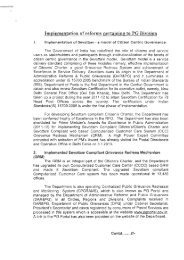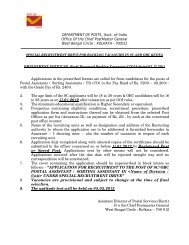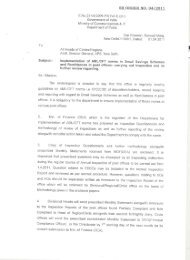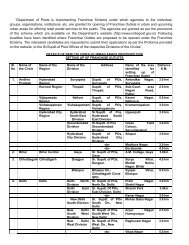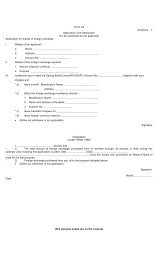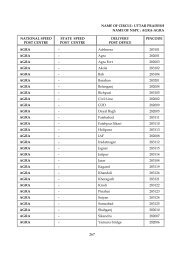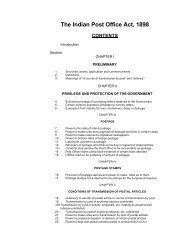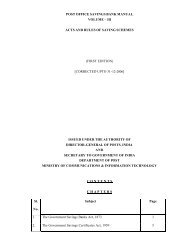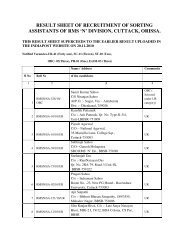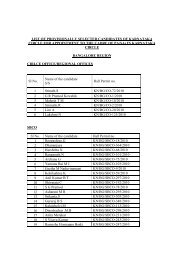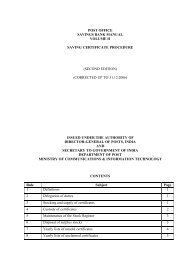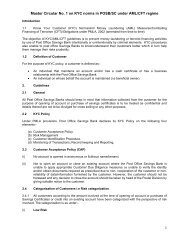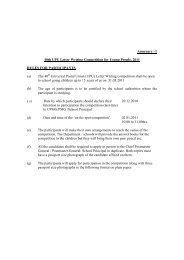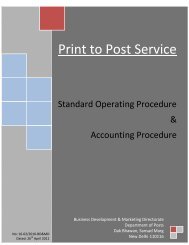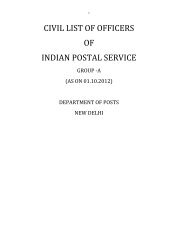Post office guide part i - India Post
Post office guide part i - India Post
Post office guide part i - India Post
Create successful ePaper yourself
Turn your PDF publications into a flip-book with our unique Google optimized e-Paper software.
12. Prepayment of postage in cash - (1) Certain important post <strong>office</strong>s are authorized by<br />
the Head of the Circle to realize the postage charges in cash from firms or other persos who post a<br />
very large number of unregistered packets subject to a minimum of 500 packets at a time in big<br />
cities and 250 in small towns. Certain post <strong>office</strong>s in Bombay, Calcutta, Madras, Nagpur and<br />
Delhi are also authorized by the Heads of the circle to realize the postage and registration fee on<br />
ordinary registered articles of letter mail in cash provided the sender uses special registered<br />
journals for bookinig of registered articles and the total number of articles of the same typr and<br />
weight to be registered at one time is not less than 50. Particulars of this facility can be ascertained<br />
from the nearest principal post <strong>office</strong>. The facility of pre-payment of postage in cash is also<br />
available at selected Gazetted and H.s.G. <strong>Post</strong> Offices to Firms or business establishments who<br />
post not less than 500 articles at a time in respect of letters (closed covers). Inland Letter Cards,<br />
<strong>Post</strong> Cards and un-registered parcels.<br />
(2) A similar procedure is extended in the case of registered newspapers, details of which<br />
will be found in clause 143.<br />
(3) The facility of prepayment of postage charges in cash is not available for any other<br />
classes of postal articles.<br />
13.Spoilt or defaced stamps. – (1) <strong>Post</strong>age stamps (whether adhesive, embossed, or<br />
impressed) which have been obliterated, defaced, torn, cut or otherwise rendered imperfect, or<br />
which have any work, letter, figure, or design written printed or impressed upon them otherwise<br />
than by the authority of the Central Government or which have been cut or otherwise separated<br />
from embossed envelopes, postcards, or wrapper, cannot be recognized in payment of postage.<br />
The special registration envelopes provided by the <strong>Post</strong> Office, cannot be used for the transmission<br />
of unregistered postal articles.<br />
NOTE – The perforation of postage stamps with initials, or other identifying marks traced<br />
in minute holes is not prohibited, provided they do not render the indications regarding the country<br />
of origin and value of stamps illegible.<br />
(2) The using for the payment of postage or postal fees, with intent to cause loss to the<br />
Central Government, of a stamp that has already been used for that or any other purpose, is an<br />
offence under the <strong>India</strong>n Penal Code.<br />
14. Fictitious Stamps. – The manufacture and use of fictitious postage stamps for any<br />
purpose whatsoever is prohibited, and is an offence punishable under Section 263-A of the <strong>India</strong>n<br />
Penal Code. Reproduction of stamps is, however, allowed for illustration purposes in a philatelic<br />
publication or in an article or section relating wholly to postage stamps which may appear in a<br />
publication or a general character. Such productions, however, must only be in black.<br />
GENERAL RULES AS TO POSTING<br />
15. Packing. – (1) Every letter, packet or parcel has to be stamped with the date stamps of<br />
at least two post <strong>office</strong>s and is liable to a great deal of pressure and friction in the mail bags during



